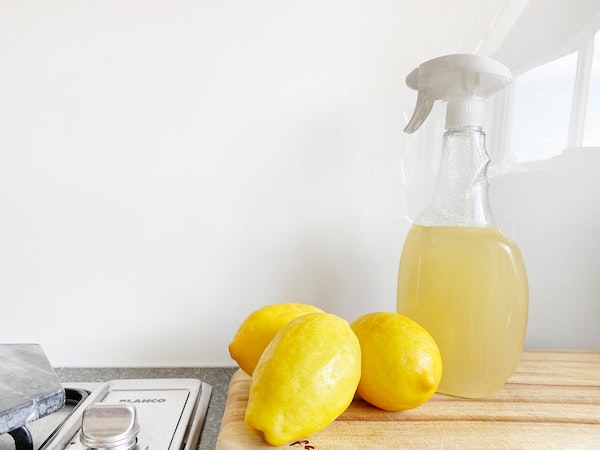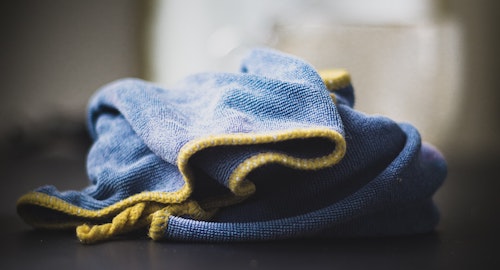Can we really keep our homes clean using just a handful of natural ingredients? Absolutely we can! Read on to find out everything you didn’t know about green cleaning.
Keeping our homes clean is, for most of us, an essential part of daily life which may be either supremely dull or actually rather satisfying, depending on your persuasion. However you feel about it, we all have to make the time to clean.
Rethink Your Products
When it comes to how we do this, we each have the power to choose what to use to get the job done. Maybe you use disposable wipes and paper towels? Do you really need to? Perhaps you’ve switched to using some greener products? Great work! But could you go one better? With Spring just around the corner, it’s a good time for us all to rethink what we use.
Cleaning is big business and there’s a multitude of products to choose from. A quick rummage in my own cleaning cupboard reveals a variety of products, all with a very specific purpose, which makes me wonder – is my kitchen grime really so different from my bathroom dirt? Most have a list of ingredients I cannot fathom (including lots with chemicals) and all with plastic packaging. If I move across the kitchen and look under the sink there’s plenty more. Products for laundry, dishwasher and washing up. Then there are the sponges, cloths, rubber gloves, the list goes on.
The availability of ‘greener’ versions of these household staples has boomed in recent years. Driven by consumer demand, concerns about pollution in our oceans and commitments to sustainability, it has become much easier for us to make better choices. Less chemicals, more natural ingredients, less packaging, all of which is great news but, could we go one step further?

The Power of Bicarbonate of Soda
Recently I read an article about the virtues of bicarbonate of soda which was recommended for cleaning the grout between tiles. Purely out of curiosity I thought I’d try this method out on some stubborn, grotty grout at the bottom of our shower. With an old toothbrush in hand, I spread a thick paste of bicarb, mixed with a little water, onto the offending area. Fifteen minutes later I returned. The bicarb had turned from white to brown and the dirt seemed to be lifting away before my very eyes! As advised, i then sprayed the whole area with a little white vinegar. The resulting ‘fizz’ elicited much excitement from both myself and indeed all family members, who were quickly called to witness this spectacle! With a little elbow grease and the toothbrush, the whole area was soon transformed.
Spurred on by this exciting discovery, I researched further and found a world of alternative cleaning. Most materials required were readily available, some I already had in my cupboards and none of them involved harsh chemicals.
Nancy Birtwhistle, a former winner of Bake Off and author of a book about green cleaning, has become well known on social media for her green cleaning tips. She recommends starting off by experimenting with an all purpose cleaner. Her recipe is 150ml water, 60ml white vinegar and 40ml surgical spirit, with essential oil for fragrance. This can be mixed up in an old spray bottle and used for cleaning worktops, the hob, cupboards, in the bathroom on mirrors, glass and tiles.
Bicarbonate of soda can be found packaging free at Scrapless in Burgess Hill
Citric Acid as a de-scaler
To clean a toilet, a sprinkle of bicarb, a squirt of vinegar and a loo brush will deodorise and clean quite adequately, however, you might need something a little stronger to remove those stains which cling to limescale. This is where citric acid can help. Citric acid is a weak organic acid which occurs naturally in citrus fruits. A tablespoon sprinkled into the toilet bowl (and preferably left overnight, followed by a good scrub) should be very effective as a de-scaler. Citric Acid can be harder to find in shops but you can find it online.
Lemon Juice or Citric acid plus Salt and Sunshine for yellowing fabrics
Yellowing fabrics, such as pillow cases, can be transformed with an easy mixture. Put them in a lemon juice OR citric acid solution [3tbsp added to 600ml hot water], with salt, and leave to soak. You need a sunny day. Peg them outside – don’t rinse or wring them – and the sun will bleach them. When you’ve extracted the juice from your lemons, use the leftover lemon halves as a cleaning tool. Lemon juice is antibacterial and antiseptic and acts as a natural bleach. Great used around taps, sinks, baths and draining boards.
Choose a clever cloth

One thing I have been using for a few years now are e-cloths. These clever, high quality microfibre cloths are designed to be used just with water and I have to say, the results are fantastic! Previously, I used a special glass cleaner on my windows, glass and gloss kitchen units. Now I realise there really is no need for any product whatsoever.
How they work:- The negatively charged dirt is attracted to the positively charged microfibres and is trapped there by the water molecules which act like a magnet! All I know is that when used in conjunction with the polishing cloths the results are impressive. If you decide to give them a try remember to wash them without using any fabric softener and you might also like to consider using a GuppyFriend or similar to limit microfibre pollution.
No time to clean? Use a Green Cleaning Company
There are several local cleaning firms who specialise in green cleaning and we even have one based here in Hurstpierpoint. Mel Croft at Glim Glam, together with her partner Nick, offer eco-friendly domestic cleaning across Mid Sussex and Thanet.
Mel said “I’ve always had a passion for environmental issues and a love of cleaning. For me it’s a kind of mindfulness that helps kick start my creative thinking as i’m also an artist.” Mel kindly offered a top cleaning tip for cleaning hard water stained shower doors.
“My top power cleaning item is good old bicarbonate of soda teamed with white vinegar. Spray or dab vinegar onto the glass and leave to soak for a while. Make a paste with the bicarb and a little water, and then, using a natural scourer (Scrapless in Burgess Hill do a great coconut fibre one) massage the paste in. Lastly, rinse & polish it off with eco-glass cleaner or an eco cloth.”
Mel can be contacted via Facebook and Instagram
Other things to consider…
- Do less cleaning? How clean do our homes need to be? Could overuse of anti-bacterial and anti-microbial agents lead to the evolution of resistant bacteria and microbes? There is evidence to suggest that contact with dirt helps to strengthen the human immune system and that too clean an environment may contribute to increases in childhood allergies and asthma. Studies have indicated that babies living with dogs and who have exposure to farm animals within the first three months of life have strengthened immune systems. Maybe a quick wipe of those kitchen surfaces with a clean, damp cloth is just fine.
- Dab don’t spray – If using chemical products, be aware that by spraying them onto surfaces,, you may also be breathing them in. A study following more than 6,000 people over a 20 year period found women in particular suffered significant health problems after long-term use of these products. Lung function decline in women working as cleaners or regularly using cleaning products at home was comparable to smoking 20 cigarettes a day over 10 to 20 years. If you’re using non-chemical alternatives, there’s no need to worry!
- Caution with ingredients – Ingredients such as hydrochloric acid and bleach, found commonly in toilet cleaner, causes severe skin burns, eye damage is is harmful to aquatic life with long lasting effects. If cleaning products are mixed together, (even some of the more natural ones) chemical reactions can take place and harmful gases can be released. For example if you mix bleach and vinegar, chlorine gas gets produced, which causes coughing, breathing issues and stinging eyes. Mixing vinegar and bicarbonate of soda together in a closed container could be also be explosive so these two are best used on their own!
Where To Buy Products
We can recommend the following online shops for natural cleaning products, especially if you want to avoid Amazon!
- Ethical Superstore
- Big Green Smile
- Infinity Foods also stock all you will need.
And Finally…
We’re all on a green cleaning journey so any changes you can make to reduce the number of plastic bottles you have in your cupboards and to use non toxic chemicals are just the start. Let us know how you get on!
